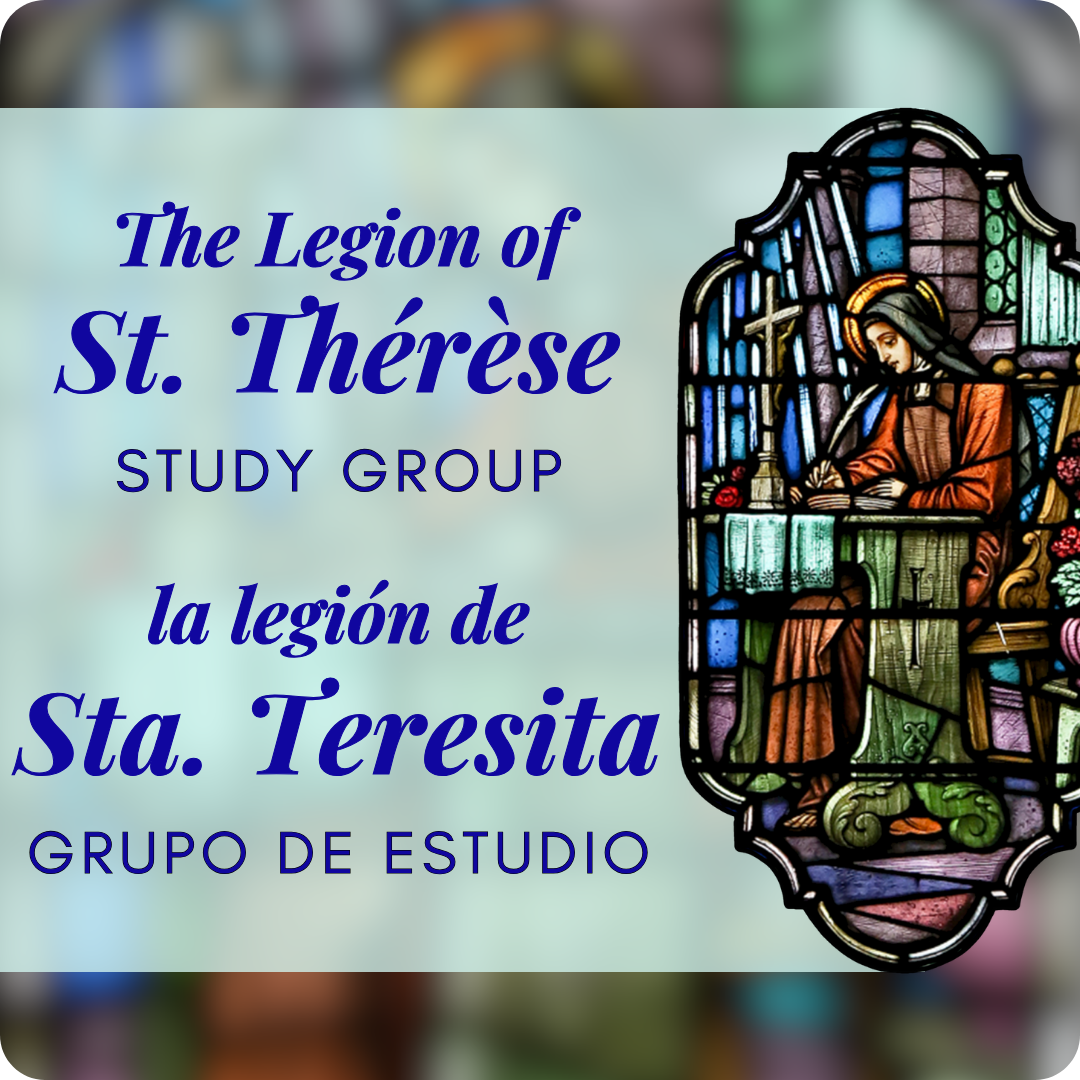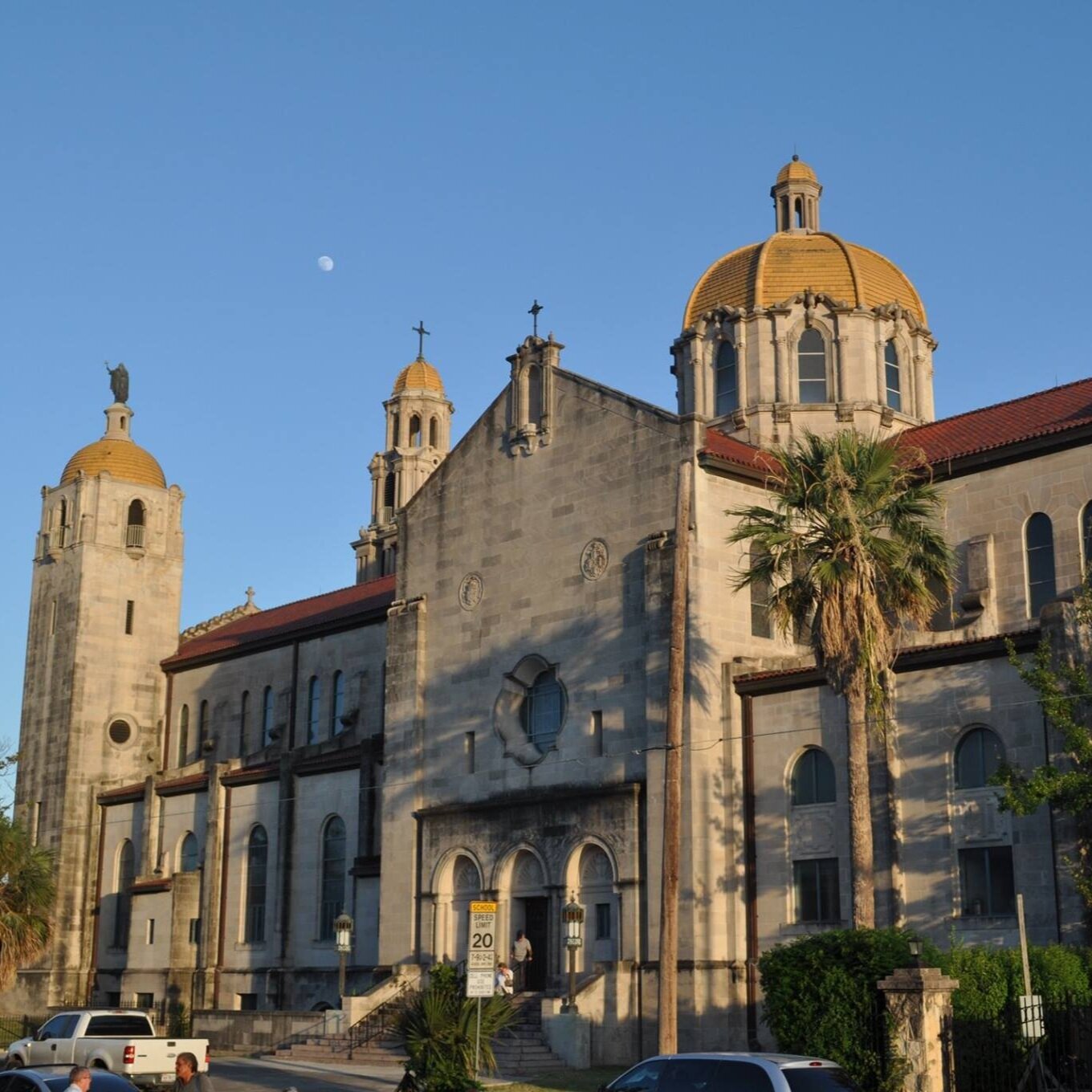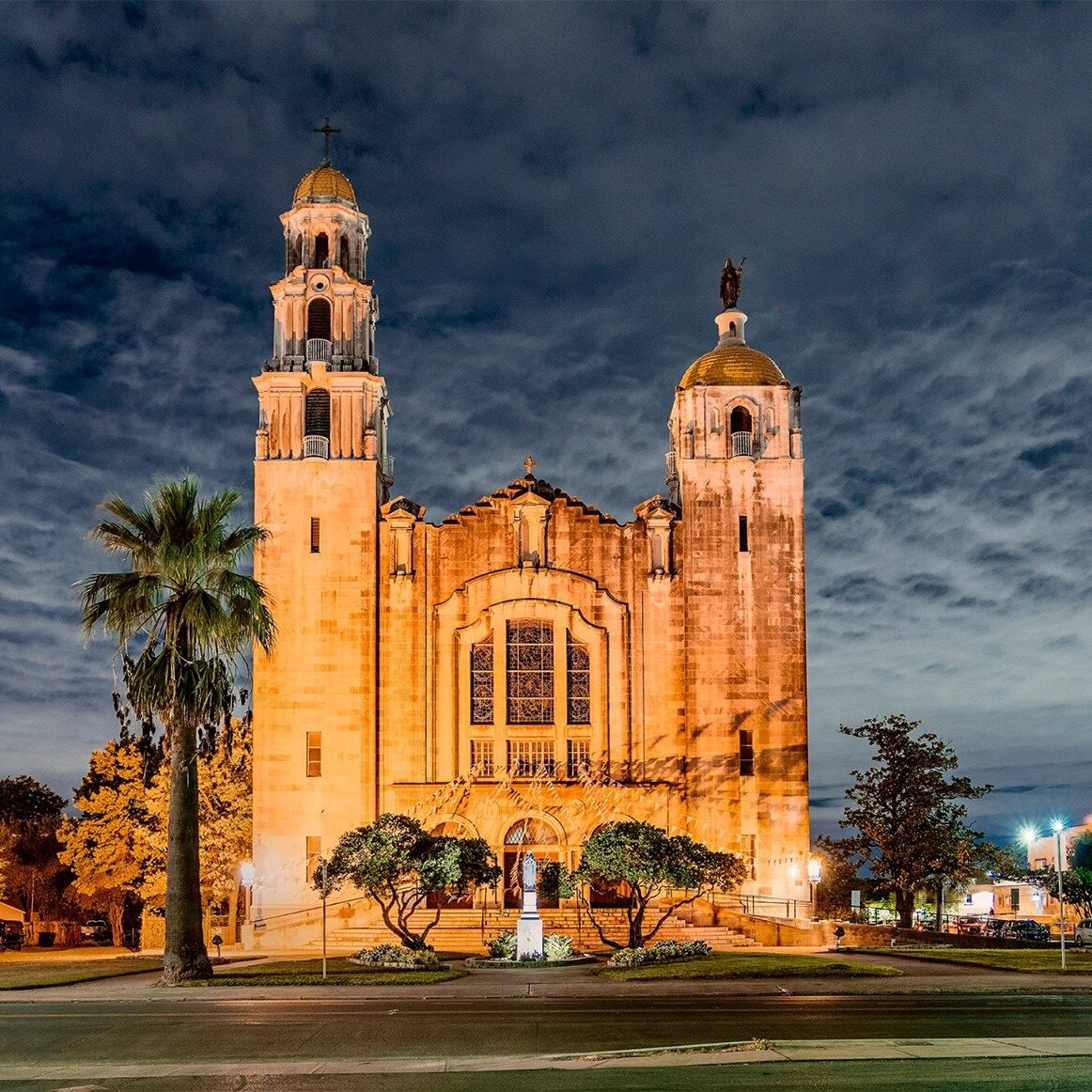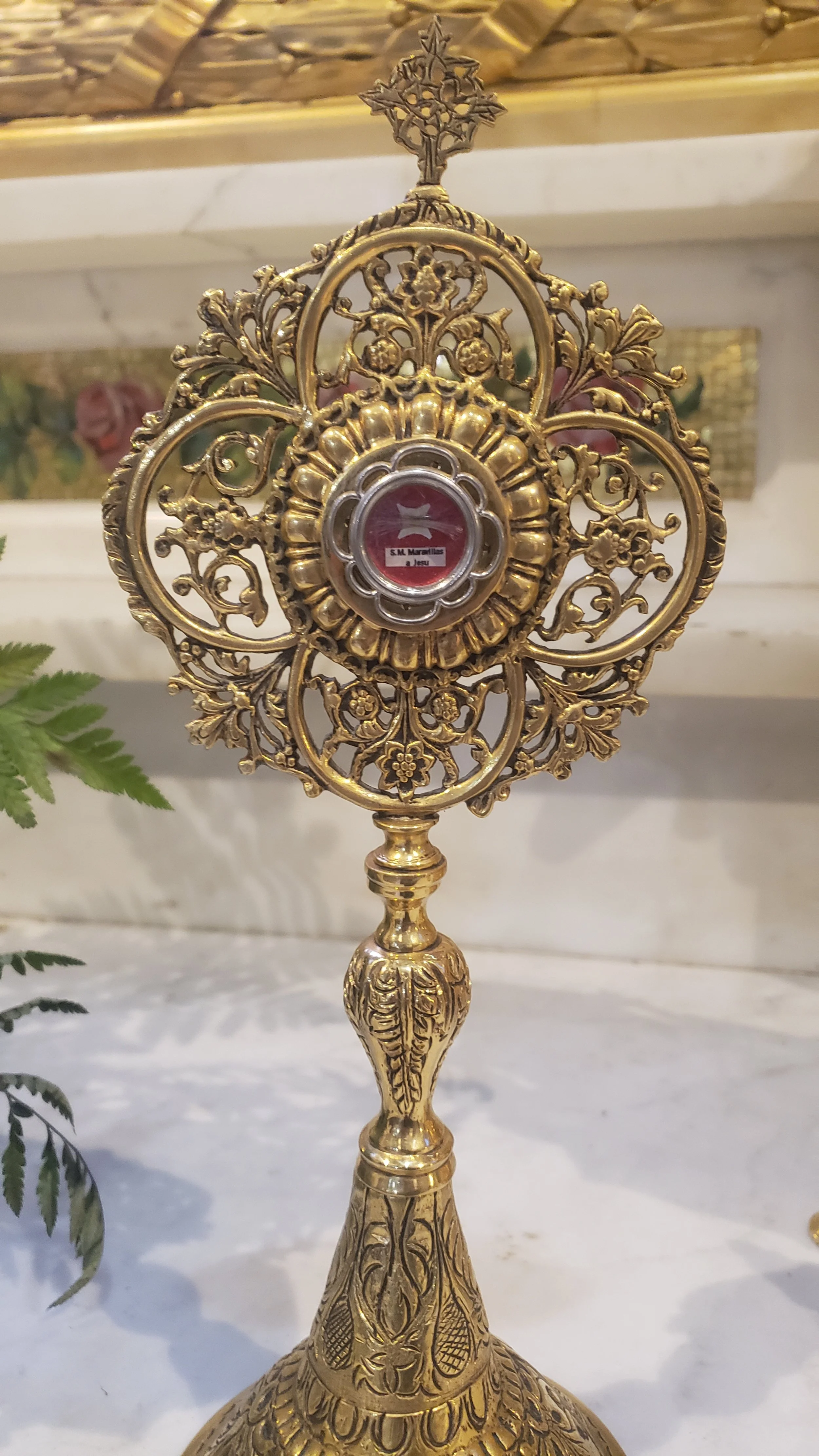Plan Your Pilgrimage
"All Christians are invited to become part of the great pilgrimage that Christ, the Church and mankind have made and must continue to make in history. The shrine which is the goal of that pilgrimage is to become ‘the Tent of Meeting’, as the Bible calls the tabernacle of the covenant.”
THE SHRINE: Memory, Presence and Prophecy of the Living God
The History of Pilgrimage
The practice of pilgrimage is rooted in Jewish tradition and the journey to Jerusalem. In the early Church, the Christian faithful continued this tradition, journeying to the Holy Land to visit and pray at the places associated with the life of Jesus Christ.
In time, pilgrimages became acts of devotion that included not only penitential themes, but also those of intercession and gratitude.
Little Flower Basilica – A Pilgrimage Church
Little Flower Basilica is a national shrine, a pilgrimage church. At Little Flower Basilica, you have the flexibility to shape your pilgrimage in a way that fulfills what you are seeking. It can be as simple as visiting on your own and walking around to pray. Or, it can include a private tour, attending Mass, lighting a candle, or visiting the Little Flower Catholic Store for a special gift or an item to help nourish your spiritual life.
Visiting the Basilica:
-
Currently, the Basilica is open 30 minutes before Mass and other services and activities. Generally,
then, the Basilica is open:
Sundays: 7:30am to 1pm; 5pm to 6:30pm.
Mondays: 11:30am to 1pm
Tuesdays: 11:30am to 1pm; 5:30pm to 7pm.
Wednesdays: 11:30am to 1pm
Thursdays: 11:30am to 1pm
Fridays: 11:30am to 1pm
Saturdays: 11:30am to 1pm; 4pm to 6:30pm
You can help us open more by volunteering as a Pilgrim Guide.
-
The Basilica Shrine, which includes:
A place to pray
Statues, stained glass windows, and more of our Little Flower St. Thérèse, as well as other Carmelite saints such as St. Teresa of Jesus, St. John of the Cross, and Our Lady Mt. Carmel.
The Shrine Chapel: a replica of the Tomb Chapel located in Lisieux, France.
Side Altars of Our Lady of Guadalupe and the Infant of Prague.
Downstairs in our undercroft you can visit:
The canonization banner of St. Thérèse
A large painting of St. Teresa of Jesus, foundress of the Discalced Carmelites.
The St. Elias Adoration Chapel (currently closed: volunteer as a Pilgrim Guide or make a donation to assist in our Preservation & Restoration).
The Little Flower Catholic Store to purchase various items such as books, statues, candles, prayer cards, and much more.
-
Basilica Heritage Tours offer an opportunity to learn about the history of Little Flower Basilica and the lives of our Discalced Carmelite saints. Also included is the special opportunity to venerate the first class relics of the Discalced Carmelite saints housed within Little Flower Basilica.
Public Tours: Registration is not required, but encouraged. Presented in partnership with the OCDS of San Antonio. See public tour dates here.
Private Tours: To request a private tour, click here.
Grow Spiritually With Us:
Indulgences:
The doctrine and practice of indulgences in the Church are closely linked to the effects of the sacrament of Penance (Catechism of the Catholic Church, 1471).
An indulgence is a remission before God of the temporal punishment due to sins whose guilt has already been forgiven, which the faithful Christian who is duly disposed gains under certain prescribed conditions through the action of the Church which, as the minister of redemption, dispenses and applies with authority the treasury of the satisfactions of Christ and the saints (Paul VI, Indulgentiarum doctrina, Norm 1).
Little Flower Basilica, from its status as a Minor Basilica, offers the faithful opportunities to receive a plenary indulgence under certain conditions:
-
Plenary or Partial indulgences may be gained by the faithful for visiting sacred places, such as Little Flower Basilica, once a year, on a day chosen by the Christian faithful, or whenever they participate in a group pilgrimage and by devoutly offering prayers during the visit, under the conditions that that they also make sacramental confession, receive Eucharistic Communion, and pray for the intentions of the Supreme Pontiff (Pope Leo XIV).
-
Red-Letter Days are celebrated at major and minor Basilicas, one of which is our very own Little Flower Basilica.
The faithful who devoutly attend Mass at Little Flower Basilica on one of these days may obtain a plenary indulgence under the conditions that they also make sacramental confession, receive Eucharistic Communion during the Mass, and pray for the intentions of the Supreme Pontiff (Pope Leo XIV).
-
January
For prayer with the Word of God
Let us pray that praying with the Word of God be nourishment for our lives and a source of hope in our communities, helping us to build a more fraternal and missionary Church.
February
For children with incurable diseases
Let us pray that children suffering from incurable diseases and their families receive the necessary medical care and support, never losing strength and hope.
March
For disarmament and peace
Let us pray that nations move toward effective disarmament, particularly nuclear disarmament, and that world leaders choose the path of dialogue and diplomacy instead of violence.
April
For priests in crisis
Let us pray for priests going through moments of crisis in their vocation, that they may find the accompaniment they need and that communities may support them with understanding and prayer.
May
That everyone might have food
Let us pray that everyone, from large producers to small consumers, be committed to avoiding wasting food, and to ensuring that everyone has access to quality food.
June
For the values of sports
Let us pray that sports be an instrument of peace, encounter and dialogue among cultures and nations, and that they promote values such as respect, solidarity and personal growth.
July
For respect for human life
Let us pray for the respect and protection of human life in all its stages, recognizing it as a gift from God.
August
For evangelization in the city
Let us pray that in large cities often marked by anonymity and loneliness, we find new ways to proclaim the Gospel, discovering creative paths to build community.
September
For the care of water
Let us pray for a just and sustainable management of water, a vital resource, so that everyone may have equal access to it.
October
For mental health ministry
Let us pray that the mental health ministry be established throughout the Church, helping to overcome the stigma and discrimination of persons with mental illnesses.
November
For the proper use of wealth
Let us pray for the proper use of wealth, that, not succumbing to the temptation of selfishness, it may always be put at the service of the common good and solidarity of those who have less.
December
For single-parent families
Let us pray for families experiencing the absence of a mother or father, that they may find support and accompaniment in the Church, and help and strength in the faith during difficult times.
Red-Letter Days
Treasures of the Basilica: Relics of the Discalced Carmelite Saints
What is a relic? A relic is the body, a part of the body, or some personal memorial of a saint preserved as worthy of veneration. A reliquary is a container for relics.
First-Class Relic: physical remains of a saint (e.g. bone, hair).
Second-Class Relic: personal effects of a saint, something they owned or frequently used (e.g. clothing, book, rosary).
Third-Class Relic: object that has touched a first-class relic.
On occasions such as the Feasts of All Carmelite Saints and All Caremelite Souls, many of the relics housed at the Basilica are displayed for the veneration of visitors.

























